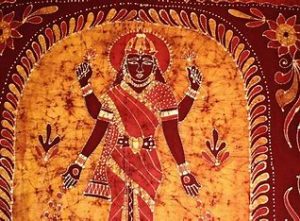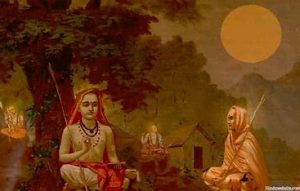
What is Vedanta?
Vedanta means the “end of the Vedas” and encompasses the broad teachings of the Hindu scriptures. Its fundamental texts are the philosophical Upanishads, the brief interpretive Brahmasutras, and the Bhagavad Gita.
It is one of the three main systems of knowledge in Indian thought.
Vedanta also refers to the “end of knowledge,” or the purpose of knowledge acquired on the path to self-realization and the dissolution back to God (As Brahman, Paramatma or Bhagavan depending on the school of thought).
Vedanta is a universal concept that affirms:
- The oneness of existence: Relating to the concept of Brahman or absolute/ Pure Consciousness or transcendent reality.
- The divinity of the soul: As the Atman or divine Self in everyone, which will be born or will die, being pure from limitations, pure and perfect t being one with Brahman. Vedanta set the goal to achieve and manifest our own divinity through jnana (or knowledge), Viveka (discerning true from non-true, real from non-real, eternal from non-eternal) and bhakti (devotion).
- The harmony of all religions: Vedanta suggests that all religions teach the same basic truths about God, the world and our relationship with god and each other. This statement stands in a sloka from the Rig Veda that says: “ Trust is one; sages call it by various names”.
According to the Vedanta teachings there are four paths we can follow to achieve the goal of understanding our divine nature. These paths are known as the Four Yogas. We can choose a path based on our personality or inclination or follow the practices of the paths in any combination. Briefly detailed those are:
Bhakti Yoga or path of devotion. This path emphasizes practices such as prayer, chanting, and meditation on God as a loving presence in our lives.
Jnana Yoga or path of Knowledge. This path emphasizes discernment to discover the divine nature within by refusing or denying all that is false or unreal (eg. Neti neti).
Karma Yoga or the path of selfless work. Karma Yoga teaches us to practice detachment and equanimity in our work and to understand that the results of any actions are beyond our control.
Raja Yoga, or the path of meditation, is a medium to experience higher states of consciousness where we achieve a deeper understanding of our divine nature.
I hope the reader can appreciate my humble effort to simplify and make this concepts more accessible to all, making clear that I do not hold any authority or claim any deeper wisdom of the Vedanta other that the my own experience and exploration over the years.
Hari om Tat Sat
